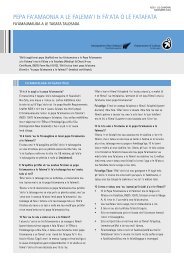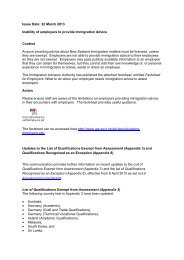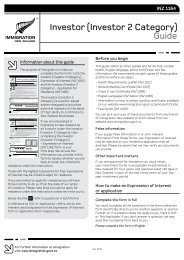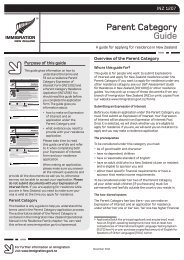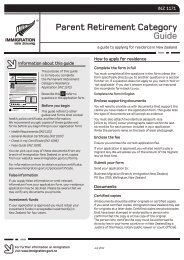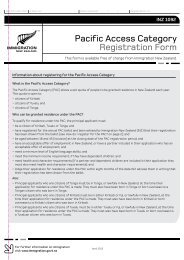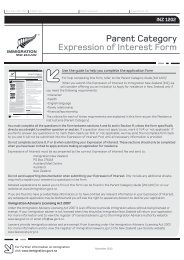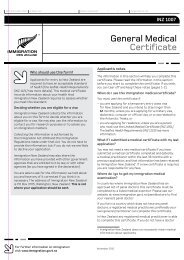Immigration Guide for Employers - Immigration New Zealand
Immigration Guide for Employers - Immigration New Zealand
Immigration Guide for Employers - Immigration New Zealand
You also want an ePaper? Increase the reach of your titles
YUMPU automatically turns print PDFs into web optimized ePapers that Google loves.
IMMIGRATION<br />
<strong>Immigration</strong> guide <strong>for</strong><br />
employers<br />
January 2013<br />
<strong>Immigration</strong> <strong>Guide</strong> <strong>for</strong> <strong>Employers</strong> - January 2013<br />
1
B<br />
IMMIGRATION GUIDE FOR EMPLOYERS<br />
This guide will help you decide the right category <strong>for</strong> workers you may need to support<br />
through the immigration process. It explains the application process and provides some<br />
advice on recruiting offshore and settling new migrants and their families into their<br />
new life in new <strong>Zealand</strong>. More detailed explanation of the instructions is available at<br />
www.immigration.govt.nz or you can phone 0508 55 88 55 to request copies of guides<br />
and application <strong>for</strong>ms.<br />
ISBn: 978-0-478-40170-7
CONTENTS<br />
IntroductIon 3<br />
Answers to common ImmIgrAtIon questIons 3<br />
Can I hire a worker from another country who is already in <strong>New</strong> <strong>Zealand</strong>? 3<br />
Can I hire a worker from another country who does not have a work or<br />
residence class visa? 4<br />
Which immigration category is appropriate to my potential employee/s? 5<br />
Is there a special category if I frequently need to hire skilled people<br />
from offshore? 7<br />
What is a visa? 7<br />
What is the difference between a residence class visa holder and a citizen? 7<br />
Does someone with <strong>New</strong> <strong>Zealand</strong> residence need a work visa? 8<br />
How does a person get permanent residence in <strong>New</strong> <strong>Zealand</strong>? 8<br />
How do I support someone to work in <strong>New</strong> <strong>Zealand</strong> and are there any conditions? 9<br />
What does a job offer need to include if it is part of an immigration application? 9<br />
How is skilled work defined? 9<br />
How can I get a job onto the Long Term or Immediate Skill Shortage lists? 9<br />
Can a <strong>for</strong>eign-born worker bring their family with them? 10<br />
Does someone working <strong>for</strong> food and board need a work visa? 10<br />
What is the <strong>New</strong> <strong>Zealand</strong> Residence Programme? 10<br />
Can someone with a criminal conviction work in <strong>New</strong> <strong>Zealand</strong>? 11<br />
Is there any type of work not allowed on a temporary visa? 11<br />
resIdence And work vIsA InstructIons 11<br />
The Skilled Migrant Category 12<br />
Talent categories 14<br />
Residence from Work Category 17<br />
Essential Skills work visas 17<br />
Specific purpose visas 19<br />
Students 19<br />
Working holidays 19<br />
1
2<br />
Family Category <strong>for</strong> residence 20<br />
General in<strong>for</strong>mation on applications 20<br />
Interim visas 20<br />
Quick guide to residence and work visa instructions 21<br />
How do I fInd stAff overseAs? 22<br />
Planning <strong>for</strong> the recruitment process 22<br />
Describing the job 24<br />
Finding and interviewing candidates 26<br />
Making an offer 27<br />
welcomIng And settlIng mIgrAnts 29<br />
Setting expectations 29<br />
Preparing the workplace 30<br />
On arrival 31<br />
Cultural differences 32<br />
Review 32<br />
Encouraging residence 32<br />
wHo cAn Help? 33<br />
<strong>Immigration</strong> <strong>New</strong> <strong>Zealand</strong> 33<br />
Support from your industry or region 34<br />
Settlement Support <strong>New</strong> <strong>Zealand</strong> 34<br />
<strong>New</strong> <strong>Zealand</strong> Qualifications Authority 34<br />
contAct tHe mInIstry of BusIness, InnovAtIon And employment 34<br />
work entItlement cHecklIst 35<br />
Employer obligations under the <strong>Immigration</strong> Act 2009 35<br />
Is the person you are checking a <strong>New</strong> <strong>Zealand</strong> citizen? 35<br />
Checking a <strong>New</strong> <strong>Zealand</strong> citizen’s work entitlement 35<br />
Checking a non-<strong>New</strong> <strong>Zealand</strong> citizen’s work entitlement 35<br />
Did VisaView confirm that this person is entitled to work <strong>for</strong> you? 35
INTRODUCTION<br />
a skilled work<strong>for</strong>ce is essential to new <strong>Zealand</strong>’s economic growth. <strong>Immigration</strong> is one of<br />
the levers Government has to help business gain and retain the skills it needs. <strong>Immigration</strong><br />
new <strong>Zealand</strong> (part of new <strong>Zealand</strong>’s Ministry of Business, Innovation and Employment) is actively<br />
promoting our country as a great place to live and work to both migrants and expat Kiwis.<br />
Businesses hire people from overseas <strong>for</strong> a variety of reasons, mainly when they cannot<br />
find suitable staff in new <strong>Zealand</strong>. <strong>Employers</strong> tell us that hiring a migrant benefits their<br />
business in a variety of ways, many which were unexpected. Some employers find the<br />
international connections of a migrant employee help their business expand. Others say<br />
the introduction of new ways of doing things can provide efficiency gains and stimulate<br />
innovation in their businesses.<br />
The new <strong>Zealand</strong> residence Programme aims to match people coming to new <strong>Zealand</strong><br />
with the skills required by our workplaces. We also want to ensure that migrants and<br />
their families settle well and stay in new <strong>Zealand</strong>. There are multiple work and residence<br />
instructions that allow <strong>for</strong>eign passport holders to live and work in new <strong>Zealand</strong>.<br />
ANSwERS TO COMMON IMMIGRATION qUESTIONS<br />
Can I hire a worker from another country who is already in <strong>New</strong> <strong>Zealand</strong>?<br />
If you want to offer a job to a <strong>for</strong>eign national in new <strong>Zealand</strong> you must check that they<br />
are legally able to work here. Citizens of new <strong>Zealand</strong> (including the Cook Islands, niue<br />
and Tokelau) and australia do not need a work visa to legally work here. residents of<br />
new <strong>Zealand</strong> and australia do not need a work visa to legally work here.<br />
a new <strong>Zealand</strong> passport; birth certificate or citizenship certificate with photograph<br />
identification; residence class visa, or endorsement in a <strong>for</strong>eign passport indicating<br />
new <strong>Zealand</strong> citizenship show that a person is able to work here. an australian passport,<br />
australian Permanent residence Visa or australian resident return Visa is also proof<br />
that they are able to work here.<br />
Most <strong>for</strong>eign passport holders eligible to work in new <strong>Zealand</strong> will have a new <strong>Zealand</strong><br />
residence class visa or new <strong>Zealand</strong> work visa label or stamp in their passport. Some<br />
people may have electronic visas and they will be able to show you a print out of the<br />
letter received from <strong>Immigration</strong> new <strong>Zealand</strong>. Some <strong>for</strong>eign passport holders may have<br />
an endorsement in their <strong>for</strong>eign passport stating that they are a new <strong>Zealand</strong> citizen.<br />
Holders of student visas, who are able to work in new <strong>Zealand</strong>, will have their work<br />
conditions noted in their visa or may have a letter from <strong>Immigration</strong> new <strong>Zealand</strong> called a<br />
‘Variation of Conditions’ attesting to their entitlement to work.<br />
<strong>Immigration</strong> <strong>Guide</strong> <strong>for</strong> <strong>Employers</strong> - January 2013<br />
3
4<br />
you can check visa details and whether a <strong>for</strong>eign national can legally work <strong>for</strong> you<br />
using <strong>Immigration</strong> new <strong>Zealand</strong>'s online VisaView system. VisaView allows registered<br />
new <strong>Zealand</strong> employers to access records held by <strong>Immigration</strong> new <strong>Zealand</strong> and to check<br />
whether a person who is not a new <strong>Zealand</strong> citizen is entitled to work in new <strong>Zealand</strong>. It<br />
also allows registered employers to confirm new <strong>Zealand</strong> passport in<strong>for</strong>mation provided<br />
by job seekers. The sharing of in<strong>for</strong>mation through VisaView is authorised by legislation.<br />
If you don’t use VisaView you must check the expiry date of the visa and the conditions<br />
listed on that visa. Many visas that are granted only allow a person to work <strong>for</strong> a<br />
specific employer in a specific location, or <strong>for</strong> a limited number of hours. If the person<br />
changes employer or location they must go through another immigration visa process<br />
to change their visa conditions.<br />
If a person you want to hire does not have a visa valid <strong>for</strong> the job you are offering they<br />
may be able to get one with your support. If someone who is not legally entitled to work<br />
in new <strong>Zealand</strong> works <strong>for</strong> you, you are committing a criminal offence.<br />
For more in<strong>for</strong>mation see A <strong>Guide</strong> to Help <strong>Employers</strong> Check Work Entitlement, available<br />
from <strong>Immigration</strong> new <strong>Zealand</strong>.<br />
DID YOU kNOw?<br />
If you use VisaView to check a <strong>for</strong>eign national’s work entitlement, a positive response will include the<br />
visa expiry date and any work-related conditions of that visa.<br />
Can I hire a worker from another country who does not have a work or<br />
residence class visa?<br />
you can make a job offer to someone who does not have a work or residence class visa<br />
but this should be conditional on them getting a work or residence class visa. They may<br />
not start working <strong>for</strong> you until they have the relevant visa, as described above.<br />
Most work and residence class visa categories require a person to have a job offer<br />
be<strong>for</strong>e they can get a new <strong>Zealand</strong> visa. To support someone in their application, you<br />
need to establish that they are eligible and there are no new <strong>Zealand</strong>ers available to do<br />
the work. This largely depends on the type of job they are being offered, and their skills<br />
and experience in doing that job. They must also meet the Government’s health and<br />
character requirements, and their qualifications and work experience must be verified.<br />
DID YOU kNOw?<br />
All work visas are issued on a fixed-term, temporary basis. The only permanent way to live and work in<br />
<strong>New</strong> <strong>Zealand</strong> is if you are a <strong>New</strong> <strong>Zealand</strong> citizen or residence class visa holder.<br />
<strong>Immigration</strong> <strong>Guide</strong> <strong>for</strong> <strong>Employers</strong> - January 2013
DID YOU kNOw?<br />
An Inland Revenue (IR) number alone is not proof of a person’s legal ability to work in <strong>New</strong> <strong>Zealand</strong>.<br />
They must have <strong>New</strong> <strong>Zealand</strong> citizenship, a work or residence class visa, or a temporary visa that<br />
specifically allows them to work.<br />
which immigration category is appropriate to my potential employee/s?<br />
There are various immigration categories designed to ensure that people migrating<br />
to new <strong>Zealand</strong> have the skills that are really needed here. They also ensure that no<br />
new <strong>Zealand</strong>ers are disadvantaged by <strong>for</strong>eign workers entering the labour market.<br />
To work out if the position you need to fill meets immigration requirements you need to<br />
answer these questions:<br />
1. Is the job considered skilled according to immigration instructions? Does it require<br />
experience and qualifications?<br />
2. Does it appear on the Long Term Skill Shortage List?<br />
3. Does it appear on the Immediate Skill Shortage List?<br />
4. are there no new <strong>Zealand</strong>ers available to do the job?<br />
5. Is it a short- or long-term role?<br />
If it is a skilled, permanent position a potential employee should check their eligibility <strong>for</strong><br />
residence under the Skilled Migrant Category. This works on a points system with the<br />
majority of points being earned <strong>for</strong> a job offer in a skilled occupation. People who are<br />
accepted under the Skilled Migrant Category will usually be granted residence and can<br />
stay and work in new <strong>Zealand</strong> permanently. See the detailed Skilled Migrant Category<br />
in<strong>for</strong>mation on page 12.<br />
If the role is on the Long Term Skill Shortage List (www.immigration.govt.nz/ltssl), and the<br />
candidate has the work experience and qualifications listed specifically <strong>for</strong> that position,<br />
they may get a work visa through the Talent Work Category. a work visa will be granted <strong>for</strong><br />
the length of the employment contract, up to a maximum of three years. although the visa<br />
is a temporary option, people who come to new <strong>Zealand</strong> on this type of visa can apply <strong>for</strong><br />
residence through the residence from Work programme after working here <strong>for</strong> two years.<br />
Once here they cannot work <strong>for</strong> another employer or in another location without applying<br />
<strong>for</strong> a variation to their visa conditions, in essence going through another application<br />
process. Once they have been granted residence, they may work <strong>for</strong> any employer.<br />
a person who has skills listed on the Immediate Skill Shortage List<br />
(www.immigration.govt.nz/issl) is able to apply <strong>for</strong> a temporary work visa if they have a<br />
relevant job offer and the work experience and qualifications listed <strong>for</strong> that position.<br />
<strong>Immigration</strong> <strong>Guide</strong> <strong>for</strong> <strong>Employers</strong> - January 2013<br />
5
6<br />
If the role you are seeking to fill is not on one of the skill shortage lists or is not<br />
considered skilled according to immigration instructions, you need to be able to<br />
demonstrate that you cannot find suitably skilled or qualified new <strong>Zealand</strong> workers or<br />
new <strong>Zealand</strong> workers who could be trained to do the work. <strong>Immigration</strong> new <strong>Zealand</strong> will<br />
undertake a labour market test to confirm this. The process is detailed on page 14.<br />
To go through the labour market test be<strong>for</strong>e you have found a candidate you should<br />
apply <strong>for</strong> approval in Principle. This means that you are pre-approved to hire people in<br />
the positions specified within the time specified, typically six to twelve months. you can<br />
apply <strong>for</strong> approval in Principle to hire many people and this is valid until you have filled the<br />
number of positions specified in your application, or until the expiry date.<br />
If you have already found someone you wish to employ, and you can meet the labour<br />
market test, you can assist the candidate to apply <strong>for</strong> an Essential Skills work visa. you<br />
will have to supply in<strong>for</strong>mation <strong>for</strong> the labour market test in support of their application.<br />
It is better to apply <strong>for</strong> and be granted an approval in Principle in advance as this<br />
provides more certainty <strong>for</strong> employer and employee.<br />
If you need to employ someone <strong>for</strong> a specific purpose or event (such as intra-corporate<br />
secondment, senior level transfer, sports referee or judge, per<strong>for</strong>ming artist, specialist<br />
machinery installer) you may be able to support that person’s work visa application<br />
through a Specific Purpose or Event Category.<br />
People with exceptional talent in the fields of art, culture or sport may, with the support<br />
of a recognised new <strong>Zealand</strong> organisation in that field, be eligible <strong>for</strong> a Talent work visa.<br />
Several industries have been recognised by <strong>Immigration</strong> new <strong>Zealand</strong> as experiencing<br />
shortages of labour. Seasonal labour schemes are being tested and developed to help in<br />
these areas. Talk to business organisations in your industry to find out what is going on<br />
in your area or visit www.immigration.govt.nz to see the latest in<strong>for</strong>mation.<br />
People holding work visas that have been granted due to a job offer, can only work <strong>for</strong><br />
that employer, in that location, and only <strong>for</strong> the term specified on their visa. Be<strong>for</strong>e<br />
their visa expires, they must go through the work visa process again and must meet the<br />
immigration requirements that are current at that time. They may qualify <strong>for</strong> another<br />
category by that time. For example, many people with new <strong>Zealand</strong> work visas may later<br />
be eligible <strong>for</strong> residence under the Skilled Migrant Category.<br />
People who hold a current australian Permanent resident visa or a current australian<br />
resident return visa can get new <strong>Zealand</strong> residence at the border provided they meet<br />
our standard immigration character and health requirements. These can be found at<br />
www.immigration.govt.nz.<br />
<strong>Immigration</strong> <strong>Guide</strong> <strong>for</strong> <strong>Employers</strong> - January 2013
DID YOU kNOw?<br />
Holders of an open work visa can work <strong>for</strong> anyone in <strong>New</strong> <strong>Zealand</strong>. Open work visas are often issued<br />
to the partners of people on more restrictive visas or young people on a working holiday.<br />
Is there a special category if I frequently need to hire skilled people from<br />
offshore?<br />
By becoming an accredited employer you can channel prospective employees through the<br />
Talent work visa category. This is a good option when you’d like to be able to hire several<br />
staff over a period of time. This category allows people to gain a resident visa after<br />
working here <strong>for</strong> two years under the residence from Work Category.<br />
The Talent (accredited Employer) work instructions require that prospective employees<br />
meet any occupational registration requirements in their industry, are aged 55 years<br />
or under, will be paid a salary of at least nZ$55,000, have a job offer of at least 30<br />
hours a week <strong>for</strong> two years or more, and meet our standard immigration health and<br />
character requirements.<br />
To become an accredited employer you need to apply to <strong>Immigration</strong> new <strong>Zealand</strong><br />
and show that your business is in a sound financial position, has a high standard of<br />
human resources policies and processes, is committed to employing and training<br />
new <strong>Zealand</strong>ers, that you comply with immigration and employment law and are a good<br />
employer. <strong>Employers</strong> are accredited <strong>for</strong> twelve months at a time.<br />
Once accredited and when you have found staff, you need to make them a job offer that<br />
complies with the conditions as above to support their application.<br />
To find out more about employer accreditation visit www.immigration.govt.nz/employ.<br />
what is a visa?<br />
a visa allows a person to travel to the new <strong>Zealand</strong> border and, provided they meet entry<br />
requirements, to stay in new <strong>Zealand</strong> in accordance with the conditions of their visa.<br />
Visas expire when a person leaves the country unless they have travel conditions allowing<br />
multiple entry to new <strong>Zealand</strong>. a person who is in new <strong>Zealand</strong> may apply <strong>for</strong> a further<br />
visa if they wish to stay past their visa expiry date. They may also apply to vary the<br />
conditions of their visa.<br />
what is the difference between a residence class visa holder and a citizen?<br />
a residence class visa holder is legally and permanently allowed to live in new <strong>Zealand</strong><br />
although they do not have all of the rights and privileges of a new <strong>Zealand</strong> citizen.<br />
These include being able to hold a new <strong>Zealand</strong> passport, receive some educational<br />
<strong>Immigration</strong> <strong>Guide</strong> <strong>for</strong> <strong>Employers</strong> - January 2013<br />
7
8<br />
scholarships, or represent new <strong>Zealand</strong> in some international sports. Owning rural land is<br />
also difficult <strong>for</strong> those people who are not new <strong>Zealand</strong> citizens.<br />
People who have been resident in new <strong>Zealand</strong> <strong>for</strong> five years, and meet conditions set<br />
by the Department of Internal affairs, are able to apply <strong>for</strong> new <strong>Zealand</strong> citizenship. For<br />
more in<strong>for</strong>mation visit www.dia.govt.nz.<br />
Does someone with <strong>New</strong> <strong>Zealand</strong> residence need a work visa?<br />
no. all new <strong>Zealand</strong> residence class visa holders are entitled to work in new <strong>Zealand</strong> <strong>for</strong><br />
any employer.<br />
How does a person get permanent residence in <strong>New</strong> <strong>Zealand</strong>?<br />
There are two options <strong>for</strong> skilled workers to apply <strong>for</strong> new <strong>Zealand</strong> residence: the Skilled<br />
Migrant Category and the residence from Work Category.<br />
For workers, the Skilled Migrant Category is the most direct pathway to residence in<br />
new <strong>Zealand</strong>. It is designed to make sure that those migrating to new <strong>Zealand</strong> have the<br />
skills that the country needs.<br />
This category works on a points system. Points are earned on the basis of an applicant’s<br />
qualifications, work experience, age, and job or job offer in new <strong>Zealand</strong>. Bonus points<br />
can be earned if their job, job offer, or experience is in an industry which has been<br />
identified as having a skills shortage or growth potential.<br />
The Skilled Migrant Category is explained in more detail on page 12.<br />
People who have held a work visa under the Talent work instructions may apply <strong>for</strong><br />
new <strong>Zealand</strong> residence under the residence from Work Category after they have been<br />
working here <strong>for</strong> two years. Some people who hold a Talent work visa may also earn<br />
enough points to apply <strong>for</strong> residence under the Skilled Migrant Category. They could<br />
apply under the Skilled Migrant Category if they didn’t want to wait the two-year period<br />
to qualify <strong>for</strong> residence under the residence from Work Category.<br />
People who wish to invest in new <strong>Zealand</strong> or establish a business here can apply <strong>for</strong> work<br />
visas under the Long-Term Business Category and residence under the Entrepreneur<br />
and Investor categories.<br />
People who have close family in new <strong>Zealand</strong> may be able to get residence through one<br />
of the Family categories. new <strong>Zealand</strong> also grants residence to a limited number of<br />
refugees and people from certain Pacific island nations each year.<br />
See our website <strong>for</strong> more in<strong>for</strong>mation on each of these residence categories.<br />
<strong>Immigration</strong> <strong>Guide</strong> <strong>for</strong> <strong>Employers</strong> - January 2013
How do I support someone to work in <strong>New</strong> <strong>Zealand</strong> and are there any conditions?<br />
<strong>Immigration</strong> instructions allow <strong>for</strong> an employer to support a potential employee’s application<br />
<strong>for</strong> a work or residence visa by providing a job offer. However, this is only applicable if the<br />
employee and/or employer meet the criteria of one of the current immigration instructions.<br />
The word ‘support’ is used, rather than ‘sponsor’ in such applications.<br />
<strong>Employers</strong> may act as ‘sponsors’ under the Talent (arts/Culture/Sports) work instructions<br />
<strong>for</strong> both Work to residence and residence from Work categories.<br />
More in<strong>for</strong>mation on what is required of an employer to support a work or residence<br />
application can be found on page 21.<br />
what does a job offer need to include if it is part of an immigration application?<br />
an offer of employment should include full contact details <strong>for</strong> the employer and<br />
prospective employee, and an employment agreement including a job description<br />
and person specification. These documents should specify the type of work offered,<br />
qualifications and experience required plus details of pay and working conditions. you<br />
may also be asked to provide evidence that you are offering the appropriate market rate<br />
to the person you wish to employ. For more detailed in<strong>for</strong>mation on making a job offer<br />
see page 27.<br />
How is skilled work defined?<br />
Skilled employment is work that uses specialist, technical or management expertise.<br />
This expertise may have been gained through recognised relevant qualifications or<br />
previous work experience.<br />
Skill level is primarily determined by the occupation’s placement on the australian and<br />
new <strong>Zealand</strong> Standard Classification of Occupations (anZSCO), an independent list of<br />
occupations compiled by Statistics new <strong>Zealand</strong> and the australian Bureau of Statistics.<br />
Skill level one occupations are the highest skilled and skill level five occupations are the<br />
lowest skilled. To access the anZSCO, see our website www.immigration.govt.nz/anzsco.<br />
How can I get a job onto the Long Term or Immediate Skill Shortage lists?<br />
The Immediate Skill Shortage List (ISSL) and the Long Term Skill Shortage List (LTSSL)<br />
are instructions instruments through which Government seeks to utilise immigration as<br />
part of the solution to meet skill shortages and skill gaps.<br />
The ISSL and LTTSL are reviewed twice a year with submissions considered from<br />
industry representatives and employers. The review process includes checking research<br />
on international skill shortages, new <strong>Zealand</strong> labour market reports, consultation with<br />
<strong>Immigration</strong> <strong>Guide</strong> <strong>for</strong> <strong>Employers</strong> - January 2013<br />
9
10<br />
industry organisations, unions, other government departments and, in the case of<br />
additions to the LTSSL, Ministerial approval.<br />
More in<strong>for</strong>mation on making a submission can be found at www.immigration.govt.nz.<br />
Can a <strong>for</strong>eign-born worker bring their family with them?<br />
yes, they can bring their partner and dependent children if they meet health, character<br />
and, in some cases, English language requirements.<br />
Where a prospective employee is applying <strong>for</strong> a work visa, their partner may be eligible<br />
<strong>for</strong> an open work visa and their school-age children eligible <strong>for</strong> student visas.<br />
Where the prospective employee is applying <strong>for</strong> new <strong>Zealand</strong> residence the partner and<br />
children would ordinarily be part of that application and may also be granted residence if<br />
the application is successful.<br />
The partner of an applicant must be legally married to, or in a civil union or de facto<br />
relationship with, the applicant. They must be able to show that their relationship<br />
is genuine and stable. a partner will only be granted residence if both people in the<br />
partnership have been living together <strong>for</strong> at least 12 months.<br />
Dependent children can be aged up to 19 years in the case of people applying <strong>for</strong> work<br />
visas and 24 years <strong>for</strong> residence class visas. To be considered dependent, children need not<br />
live with an applicant but must be able to prove that the dependant relies mainly on the<br />
applicant or their partner <strong>for</strong> financial support. They must not have children of their own.<br />
Does someone working <strong>for</strong> food and board need a work visa?<br />
yes. any activity undertaken <strong>for</strong> gain or reward is regarded as employment. This<br />
includes any work done in return <strong>for</strong> money, goods or services such as board, transport,<br />
food or clothing. People undertaking employment in new <strong>Zealand</strong> must be legally<br />
allowed to work here in that role, which means having the correct work or residence<br />
class visa or citizenship.<br />
what is the <strong>New</strong> <strong>Zealand</strong> Residence Programme?<br />
The new <strong>Zealand</strong> residence Programme (nZrP) contains residence goals set by<br />
Government to meet new <strong>Zealand</strong>’s ongoing skills requirements and humanitarian<br />
commitments. The number of places available to migrants under the nZrP is reviewed by<br />
Cabinet periodically.<br />
Currently the overall nZrP is set at 135,000 to 150,000 approved places between<br />
July 2011 and June 2014. This includes:<br />
<strong>Immigration</strong> <strong>Guide</strong> <strong>for</strong> <strong>Employers</strong> - January 2013
• The Skilled/Business stream (approximately 80,700 to 89,925 places),<br />
• The uncapped Family Sponsored stream, including Partner and Dependent Child<br />
categories (approximately 29,700 to 32,100 places, <strong>for</strong> the planning purposes of<br />
<strong>Immigration</strong> new <strong>Zealand</strong>),<br />
• The Capped Family Sponsored stream, including Parent, Siblings and adult Child<br />
categories (approximately 14,850 to 16,500 places), and<br />
• The International/Humanitarian stream (approximately 9,750 to 11,475 places).<br />
Can someone with a criminal conviction work in <strong>New</strong> <strong>Zealand</strong>?<br />
all people entering new <strong>Zealand</strong> must meet our character requirements. People who<br />
have serious criminal convictions will not be allowed into the country. For more specific<br />
in<strong>for</strong>mation go to our website and see the in<strong>for</strong>mation on character requirements.<br />
Is there any type of work not allowed on a temporary visa?<br />
a person with a temporary visa cannot provide commercial sexual services, or operate or<br />
invest in a business of prostitution in new <strong>Zealand</strong>. People with open work visas can work<br />
in any other job. It is up to the employer to check the work visas of employees and make<br />
sure their work meets any restrictions that are noted in the visa.<br />
DID YOU kNOw?<br />
<strong>New</strong> <strong>Zealand</strong> employers may offer employment to any <strong>for</strong>eign national but the prospective employee<br />
cannot start work until they have the appropriate work or residence class visa.<br />
RESIDENCE AND wORk vISA INSTRUCTIONS<br />
new <strong>Zealand</strong> residence instructions are geared towards attracting those migrants<br />
who have the skills that are in demand in new <strong>Zealand</strong>. This not only contributes to the<br />
growth and prosperity of new <strong>Zealand</strong> businesses, but ensures that migrants can find<br />
decent work and a place to fit into.<br />
The instructions which define to whom work visas can be granted, aim to address<br />
specific, more immediate, skill shortages and employer needs. While an industry's or<br />
employer’s needs are important in work visa decisions, these must be balanced with the<br />
security needs of our country and the need to ensure that the entry of workers from<br />
offshore does not undermine the wages and conditions of new <strong>Zealand</strong> workers.<br />
<strong>Immigration</strong> <strong>Guide</strong> <strong>for</strong> <strong>Employers</strong> - January 2013<br />
11
12<br />
Work visas are granted on a temporary basis. However, people who have worked legally in<br />
new <strong>Zealand</strong> may be able to apply <strong>for</strong> new <strong>Zealand</strong> residence if they subsequently meet<br />
the criteria in our residence instructions.<br />
The Skilled Migrant Category<br />
The Skilled Migrant Category is designed to make sure that those migrating to<br />
new <strong>Zealand</strong> have the skills that the country needs and is the main pathway to residence<br />
in new <strong>Zealand</strong>.<br />
The application and selection process <strong>for</strong> the Skilled Migrant Category works on a points<br />
system. Points are earned on the basis of a migrant’s qualifications, work experience,<br />
age, close family in new <strong>Zealand</strong>, and job (or job offer) in new <strong>Zealand</strong>. For example,<br />
an offer of skilled employment in new <strong>Zealand</strong> is worth 50 points. Six years relevant<br />
work experience earns 20 points, a recognised tertiary qualification 50 or 60 points.<br />
Bonus points can be earned if the applicant’s offer of employment, work experience<br />
or qualification is in an area or industry which has been identified, by <strong>Immigration</strong><br />
new <strong>Zealand</strong>, as having a skills shortage or growth potential.<br />
a score of 100 points or more is required to begin the four-stage Skilled Migrant<br />
Category application process.<br />
<strong>Immigration</strong> <strong>Guide</strong> <strong>for</strong> <strong>Employers</strong> - January 2013
Step 1<br />
The applicant fills in and submits an Expression of Interest (EOI) <strong>for</strong>m, either online or<br />
on paper. This includes in<strong>for</strong>mation on things such as their skills, work experience, job<br />
offer and family circumstances. If the applicant has a partner and dependent children<br />
they should be included in the EOI.<br />
Step 2<br />
Submitted EOIs go into a pool where they are ranked according to the number of<br />
points claimed. Every <strong>for</strong>tnight EOIs are selected from the pool using criteria set by the<br />
Minister of <strong>Immigration</strong>. This criteria is reviewed every six months. Current selection<br />
criteria means:<br />
• EOIs that have 140 points or more will be selected automatically from the pool.<br />
• Other EOIs which include a <strong>New</strong> <strong>Zealand</strong> job, or job offer, will be ranked and<br />
selected in sufficient numbers to meet new <strong>Zealand</strong> residence Programme<br />
numbers <strong>for</strong> skilled migrants.<br />
• If enough places are available, other EOIs may be selected on the basis of<br />
additional specific criteria which the Minister of <strong>Immigration</strong> sets every six months.<br />
Step 3<br />
When an EOI is selected, the in<strong>for</strong>mation it contains will be verified and the applicant<br />
may be invited to apply <strong>for</strong> residence. The applicant then has four months in which to<br />
collect all their required documentation (including job offer documentation) together<br />
and submit their residence application.<br />
If an EOI is not immediately selected, it remains in the pool <strong>for</strong> six months and may<br />
be selected within that time depending on the number of places available under the<br />
new <strong>Zealand</strong> residence Programme. If an applicant’s situation changes and they are<br />
able to earn more points, <strong>for</strong> example if they get a job offer, they are able to amend<br />
their EOI while it is in the pool.<br />
Step 4<br />
Once a residence application has been received the applicant’s supporting<br />
documentation is checked and their application assessed. They may be asked to attend<br />
an interview at this stage.<br />
If successful in their residence application, the applicant, and all eligible family members<br />
included in their application, will be issued with a new <strong>Zealand</strong> residence class visa. In<br />
some instances the applicant may be issued with a work visa and be able to apply <strong>for</strong><br />
residence at a later date.<br />
<strong>Immigration</strong> <strong>Guide</strong> <strong>for</strong> <strong>Employers</strong> - January 2013<br />
13
14<br />
To work out how many points a potential employee would score go to<br />
www.immigration.govt.nz/pointsindicator, or see the Self-Assessment <strong>Guide</strong> <strong>for</strong><br />
Residence in <strong>New</strong> <strong>Zealand</strong> (INZ 1003) available on our website or from branch offices.<br />
<strong>Immigration</strong> <strong>Guide</strong> <strong>for</strong> <strong>Employers</strong> - January 2013<br />
Steps in the Skilled Migrant Category application process<br />
Worker calculates their points using the Self-Assessment <strong>Guide</strong> <strong>for</strong> Residence in<br />
<strong>New</strong> <strong>Zealand</strong> (INZ 1003) or online points indicator<br />
Worker completes and submits their Expression of Interest (EOI) into the pool<br />
EOIs in the pool are ranked and selected according to current immigration<br />
selection criteria<br />
EOI in<strong>for</strong>mation is verified by an immigration officer<br />
Worker is invited to apply <strong>for</strong> residence<br />
Migrant completes and submits the residence application (including job offer<br />
documentation)<br />
residence application in<strong>for</strong>mation is checked and the application assessed by an<br />
immigration officer<br />
Successful applicant is issued with a residence class visa<br />
Talent categories<br />
a Talent work visa is appropriate <strong>for</strong> people who either have a job offer from an<br />
accredited employer, a job offer in an occupation on the Long Term Skill Shortage
List (LTSSL), or an exceptional talent in the arts, culture or sports. a Talent work visa can<br />
be issued <strong>for</strong> 30 months and after two years working in new <strong>Zealand</strong> the holder is eligible<br />
to apply <strong>for</strong> new <strong>Zealand</strong> residence under the residence from Work instructions.<br />
a Talent (accredited Employer) work visa requires the candidate to have a job offer<br />
from an employer accredited with <strong>Immigration</strong> new <strong>Zealand</strong>. The job must be <strong>for</strong> at<br />
least two years, full time, and paying a salary of at least nZ$55,000 (based on a 40hour<br />
week). The applicant must be aged 55 years or under. For occupations where<br />
professional registration is a requirement to practise, the applicant must meet those<br />
registration requirements.<br />
a Talent (LTSSL) work visa requires the candidate to have a job offer in an occupation<br />
on the Long Term Skill Shortage List <strong>for</strong> which they are suitably skilled and qualified. The<br />
job must be <strong>for</strong> at least two years, full time and paying a salary of at least nZ$45,000<br />
(based on a 40-hour week). For those occupations where professional registration is a<br />
requirement to practise, the applicant must meet those requirements.<br />
a Talent (arts, Culture, Sports) work visa requires the candidate to have an exceptional<br />
talent in the arts, culture or sports and a job offer requiring that expertise. They should<br />
be prominent in their field and must be supported by a new <strong>Zealand</strong> organisation<br />
nationally recognised in that field. The applicant must be aged 55 years or under. The<br />
applicant must also have a sponsor. The organisation may choose to act as sponsor, or<br />
the applicant may be sponsored by an individual.<br />
See an example of the application process <strong>for</strong> a Talent (LTSSL) work visa on page 16.<br />
Notes<br />
<strong>Immigration</strong> <strong>Guide</strong> <strong>for</strong> <strong>Employers</strong> - January 2013<br />
15
16<br />
Steps in the Talent (Long Term Skill Shortage List) work visa application process<br />
<strong>Immigration</strong> <strong>Guide</strong> <strong>for</strong> <strong>Employers</strong> - January 2013<br />
Employer checks if job vacancy is on the Long Term Skill Shortage List<br />
Employer ensures job meets appropriate criteria<br />
(24 months, minimum 30 hours per week, etc)<br />
If so, employer locates an appropriately skilled overseas worker<br />
Worker fills out Work Visa Application (INZ 1015)<br />
Employer supplies a job offer to the overseas worker that meets the criteria<br />
Employer fills out designated sections of the Employer Supplementary Form (INZ 1113)<br />
and provides this to the worker to send in<br />
Worker submits application to nearest <strong>Immigration</strong> new <strong>Zealand</strong> branch<br />
Successful worker granted visa by <strong>Immigration</strong> <strong>New</strong> <strong>Zealand</strong><br />
Worker to notify employer of success of application<br />
Employer to check work visa be<strong>for</strong>e overseas worker starts work<br />
Worker can apply <strong>for</strong> residence under the residence from Work Category after two years
Residence from work Category<br />
People who receive a new <strong>Zealand</strong> Work to residence visa under a Talent category may<br />
apply <strong>for</strong> residence after working <strong>for</strong> two years in new <strong>Zealand</strong>.<br />
People applying <strong>for</strong> residence from Work, who have held a Talent (arts, Culture, Sports)<br />
work visa, must have been actively involved in their specialist field during their last<br />
two years in new <strong>Zealand</strong> and still be prominent in that field. The applicant must be<br />
supported by a nationally recognised organisation in their field, sponsored by that<br />
organisation or an individual, and must not have sought welfare aid during their time in<br />
new <strong>Zealand</strong>.<br />
People applying <strong>for</strong> residence from Work, who have held a Talent (LTSSL) work visa, must:<br />
• still be working in an occupation on the LTSSL or that was on the LTSSL at the time<br />
they obtained their work visa<br />
• be receiving a salary of at least nZ$45,000<br />
• be aged 55 years or under<br />
• meet the professional registration requirements of their occupation.<br />
People applying <strong>for</strong> residence from Work who have held a Talent (accredited Employer)<br />
work visa must have worked <strong>for</strong> an accredited employer <strong>for</strong> two years and have current<br />
full-time employment. They should be receiving a salary of at least nZ$55,000.<br />
The salary requirements above are based on a 40-hour week. applicants must also meet<br />
the professional registration requirements of their occupation.<br />
Essential Skills work visas<br />
<strong>Employers</strong> who are unable to find suitable workers in new <strong>Zealand</strong> and have roles that do<br />
not meet Skilled Migrant or Talent work visa criteria may be able to assist an employee<br />
to get an Essential Skills work visa. an employer must be able to demonstrate that they<br />
cannot find suitably skilled or qualified new <strong>Zealand</strong> workers, or new <strong>Zealand</strong> workers<br />
who could be readily trained to do the work. <strong>Immigration</strong> new <strong>Zealand</strong> will undertake a<br />
labour market test to confirm this.<br />
an employer meets the labour market test by proving that there are no suitable<br />
employees in new <strong>Zealand</strong> and that they have made genuine attempts to attract and<br />
recruit new <strong>Zealand</strong> workers <strong>for</strong> the positions at the current market salary. This could<br />
include evidence of advertisements placed, responses received, industry statistics on<br />
vacancies, or training in place to address shortages. <strong>Immigration</strong> new <strong>Zealand</strong> may<br />
also consult with Work and Income or industry organisations to ensure that the labour<br />
market test is met. We will always seek advice from Work and Income when conducting<br />
<strong>Immigration</strong> <strong>Guide</strong> <strong>for</strong> <strong>Employers</strong> - January 2013<br />
17
18<br />
a labour market test <strong>for</strong> workers in lower-skilled occupations (those at skill level four or<br />
five on the anZSCO – see page 9 <strong>for</strong> more in<strong>for</strong>mation on the anZSCO).<br />
If you are employing overseas workers to work in lower-skilled work the processing time<br />
may be longer, as we will be seeking advice from Work and Income in every case. To speed<br />
this process up, we recommend that employers approach Work and Income themselves to<br />
try to fill the lower-skilled vacancies be<strong>for</strong>e offering employment to overseas workers. If<br />
Work and Income already knows these positions cannot be filled, it will be able to provide<br />
this advice to us sooner, reducing the processing time of the application.<br />
To go through the labour market test be<strong>for</strong>e you have found a candidate, you should<br />
apply <strong>for</strong> approval in Principle. This means that you are pre-approved to hire people in<br />
the positions specified within the time specified, typically six to twelve months. you can<br />
apply <strong>for</strong> approval in Principle to hire many people and this is valid until you have filled the<br />
number of positions specified in your application, or until the expiry date.<br />
If you have already found someone you wish to employ, and you can meet the labour market<br />
test (by proving that there are no suitable employees in new <strong>Zealand</strong> and that you have<br />
made genuine attempts to attract and recruit new <strong>Zealand</strong> workers) you can assist the<br />
candidate to apply <strong>for</strong> an Essential Skills work visa. you will have to supply in<strong>for</strong>mation to<br />
meet the labour market test, as described above, to support their application.<br />
If you have a vacancy in an occupation listed on the Immediate Skill Shortage List<br />
(ISSL) in your region, or the Long Term Skill Shortage List (LTSSL), you will need to make<br />
a job offer to the person who you wish to employ so that they can satisfy the work<br />
visa requirements. The prospective employee must be able to demonstrate their skills<br />
and experience relevant to the job as described on the skill shortage lists and meet<br />
immigration health and character requirements.<br />
Important in<strong>for</strong>mation <strong>for</strong> Canterbury employers<br />
If you are offering employment in the Canterbury region in support of an Essential Skills<br />
work visa application and the occupation is at skill level three, four or five on the anZSCO<br />
(see page 9), or are requesting an approval in Principle, you must engage with the<br />
Canterbury Skills and Employment Hub when attempting to recruit suitable new <strong>Zealand</strong><br />
citizens or residents. This does not apply to occupations on the Long Term Skill Shortage<br />
List, Immediate Skill Shortage List or Canterbury Skill Shortage List. after you have<br />
engaged with the Canterbury Skills and Employment Hub, they will provide you with a<br />
letter confirming whether there are any suitable new <strong>Zealand</strong>ers available. This letter<br />
must be submitted with the work visa application or approval in Principle request.<br />
To contact the Canterbury Skills and Employment Hub see www.opportunitycanterbury.org.nz<br />
or call 0800 CanHub (0800 226 482).<br />
<strong>Immigration</strong> <strong>Guide</strong> <strong>for</strong> <strong>Employers</strong> - January 2013
Specific purpose visas<br />
a special category exists <strong>for</strong> people who need to employ someone <strong>for</strong> a specific purpose or<br />
event. applicants under this category might include corporate secondments, senior-level<br />
transfers, sports players and professional sports coaches, per<strong>for</strong>ming artists, specialist<br />
machinery installers, film crews, and others.<br />
In this category there must be proof of the special need <strong>for</strong> such an employee and proof<br />
of the employee’s ability and experience in doing that job. <strong>Immigration</strong> new <strong>Zealand</strong> must<br />
be satisfied that no new <strong>Zealand</strong> workers will be disadvantaged by the specialist being<br />
employed. Most visas under this category are issued <strong>for</strong> three to twelve months.<br />
Students<br />
Some students are able to work <strong>for</strong> up to 20 hours a week during the academic year<br />
and some may work full-time over the summer holidays. Students studying in some<br />
fields are eligible <strong>for</strong> work visas to enable them to fulfil practical course requirements.<br />
all students who are legally allowed to work in new <strong>Zealand</strong> will have an endorsement in<br />
their passports, or a letter from us (variation of conditions) stating their entitlement to<br />
work and the limitations on such work.<br />
after a student has completed their studies they may be able to get a work visa<br />
under the Study to Work instructions. They must be either fulfilling practical training<br />
requirements that are part of their course requirements, have passed and completed<br />
a qualification in new <strong>Zealand</strong> which took three years or more to complete, or gained a<br />
qualification which would earn them points under Skilled Migrant Category criteria.<br />
For specific criteria <strong>for</strong> students and graduates go to www.immigration.govt.nz/study.<br />
working holidays<br />
new <strong>Zealand</strong> has reciprocal agreements with more than 20 countries allowing people<br />
aged 18 to 30 years to work temporarily while on holiday in new <strong>Zealand</strong>. The conditions<br />
of work visas <strong>for</strong> working holidaymakers vary according to the country they come from.<br />
Working holidaymakers from most participating countries can stay in new <strong>Zealand</strong> <strong>for</strong> up<br />
to a year. Citizens of the united Kingdom can stay <strong>for</strong> 23 months.<br />
Working holidaymakers can’t take a permanent job but they can have several jobs with<br />
different employers. Some are only allowed to work <strong>for</strong> each employer <strong>for</strong> three months,<br />
and some are able to work <strong>for</strong> up to a year. Conditions are noted on the work visa granted.<br />
young citizens of most qualifying countries can apply from anywhere in the world.<br />
Some working holidaymakers must apply from their home country. Online applications<br />
are generally processed in a couple of days and an electronic visa will be issued. For<br />
<strong>Immigration</strong> <strong>Guide</strong> <strong>for</strong> <strong>Employers</strong> - January 2013<br />
19
20<br />
more detailed in<strong>for</strong>mation on working holiday schemes offered by new <strong>Zealand</strong> go to<br />
www.immigration.govt.nz/whs.<br />
Family Category <strong>for</strong> residence<br />
People may apply to live in new <strong>Zealand</strong> if they are supported or sponsored by a family<br />
member who is already a new <strong>Zealand</strong> citizen or residence class visa holder. People<br />
applying through the Family residence Category must be the partner, dependent child,<br />
parent, brother, sister or adult child of a new <strong>Zealand</strong> citizen or residence class visa<br />
holder. For more detailed in<strong>for</strong>mation on go to www.immigration.govt.nz.<br />
General in<strong>for</strong>mation on applications<br />
all people applying <strong>for</strong> new <strong>Zealand</strong> residence and work visas must meet our standard<br />
immigration health, character and, in most cases, English language requirements. These<br />
are explained in detail on the immigration website.<br />
Each application must be submitted on the appropriate application <strong>for</strong>m, and be<br />
accompanied by the relevant fee, applicant’s passport, passport-sized photographs and<br />
additional in<strong>for</strong>mation as specified on each <strong>for</strong>m. In<strong>for</strong>mation on current fees, branch<br />
locations and processing times can be found at www.immigration.govt.nz.<br />
For more detailed in<strong>for</strong>mation on the immigration instructions above, and to download<br />
<strong>for</strong>ms and guides, go to www.immigration.govt.nz or call free (within new <strong>Zealand</strong>)<br />
0508 55 88 55.<br />
Interim visas<br />
If you have an employee who is applying <strong>for</strong> a further work visa then they may be granted<br />
an interim visa that allows them to stay in new <strong>Zealand</strong> lawfully while their application is<br />
processed. They may be eligible to continue working on an interim visa if the job is in the<br />
same position, <strong>for</strong> the same employer and in the same location as their current visa.<br />
<strong>Immigration</strong> new <strong>Zealand</strong> will make a decision on whether to grant a person an interim<br />
visa close to the day their current visa expires and will in<strong>for</strong>m them by email or letter.<br />
a person cannot apply <strong>for</strong> an interim visa and there is no guarantee that one will be<br />
granted. There are also no fees or <strong>for</strong>ms. Interim visas are valid <strong>for</strong> a maximum of<br />
six months or until a decision is made on the person’s temporary visa application –<br />
whichever is earlier.<br />
<strong>Immigration</strong> <strong>Guide</strong> <strong>for</strong> <strong>Employers</strong> - January 2013
quick guide to residence and work visa instructions<br />
Your employment need Your best option what you need to do<br />
I need skilled, permanent<br />
workers from overseas.<br />
I have a long-term need to<br />
regularly employ skilled workers<br />
from overseas.<br />
I need to employ an artist,<br />
sportsperson, sports coach or<br />
someone with an exceptional<br />
talent.<br />
I’m seeking to fill a long-term<br />
vacancy in an occupation on the<br />
Long Term Shortage Skill List.<br />
I have a temporary skill shortage<br />
in an occupation on the<br />
Immediate Skill Shortage List.<br />
I need to fill a temporary<br />
position or positions <strong>for</strong> which<br />
I’m unable to find suitable<br />
workers in <strong>New</strong> <strong>Zealand</strong>.<br />
I need to employ someone<br />
from overseas <strong>for</strong> a specific<br />
purpose or event, <strong>for</strong> example:<br />
a tournament, show, or<br />
specialist installer.<br />
I want to employ a student or<br />
a trainee to provide them with<br />
work experience.<br />
I want to employ a young person<br />
from overseas who’s here on a<br />
working holiday.<br />
Employ people under the Skilled<br />
Migrant Category (SMC).<br />
Employ people under the Talent<br />
(Accredited Employer) Work<br />
Category. They can then Work<br />
to Residence.<br />
Employ people under the Talent<br />
(arts, culture, sports) Work<br />
Category. They can then Work to<br />
Residence.<br />
Employ someone under Talent<br />
(LTSSL) Work Category. They can<br />
then Work to Residence.<br />
Employ people under<br />
the Essential Skills work<br />
instructions (temporary).<br />
Employ people with a work visa<br />
under the Essential Skills work<br />
instructions (temporary).<br />
Employ someone with a<br />
work visa under the Specific<br />
Purpose or Event instructions<br />
(temporary).<br />
Employ someone with a work<br />
visa under the Study to Work<br />
instructions (temporary).<br />
Employ someone on a working<br />
holiday scheme.<br />
Check that the job meets<br />
immigration skill level<br />
requirements. Provide a job offer<br />
to assist the SMC application.<br />
Apply to become an<br />
accredited employer. Once<br />
accredited provide job offer<br />
to facilitate applicant’s Talent<br />
work visa application.<br />
Assist the applicant to prove<br />
their talent is exceptional and<br />
provide a job offer.<br />
Provide a job offer to assist<br />
candidate’s application.<br />
Provide a job offer to assist<br />
candidate’s application.<br />
Apply <strong>for</strong> Approval in Principle<br />
and prove that you have<br />
been unable to find staff in<br />
<strong>New</strong> <strong>Zealand</strong>.<br />
Prove the employee is suitably<br />
qualified, their skills will benefit<br />
<strong>New</strong> <strong>Zealand</strong> and they are<br />
needed <strong>for</strong> the period of time<br />
requested. Provide a job offer.<br />
Provide a job offer to assist<br />
candidate’s application.<br />
Use VisaView to check they have<br />
a valid visa.<br />
<strong>Immigration</strong> <strong>Guide</strong> <strong>for</strong> <strong>Employers</strong> - January 2013<br />
21
22<br />
<strong>Immigration</strong> <strong>Guide</strong> <strong>for</strong> <strong>Employers</strong> - January 2013<br />
HOw DO I FIND STAFF OvERSEAS?<br />
Hiring staff from overseas can be more complex, costly, and time-consuming than hiring<br />
a new <strong>Zealand</strong>er from within the country. This section will help you think through the<br />
issues particular to offshore recruitment and will draw your attention to considerations<br />
that may not be part of your everyday recruitment activities. It is not intended as a<br />
general recruitment guide.<br />
The Ministry of Business, Innovation and Employment publishes a How to Hire <strong>Guide</strong> <strong>for</strong><br />
<strong>Employers</strong> which guides employers through the general recruitment process and relevant<br />
employment laws. It does not cover immigration issues but complements the in<strong>for</strong>mation<br />
contained in this guide. The How to Hire <strong>Guide</strong> <strong>for</strong> <strong>Employers</strong> can be downloaded from<br />
www.dol.govt.nz or ordered by calling 0800 20 90 20.<br />
Planning <strong>for</strong> the recruitment process<br />
In deciding to recruit offshore you need to check that people you may want to hire will<br />
be able to get new <strong>Zealand</strong> work or residence class visas. This largely depends on the<br />
role you have to offer them. The first section of this booklet along with in<strong>for</strong>mation on<br />
the immigration website will direct you to the immigration category most appropriate<br />
to your situation.<br />
When planning offshore recruitment you should consider which country or countries you<br />
are likely to find suitable candidates in.<br />
• Which countries have skilled workers in the field you need?<br />
• Which countries are known as leaders in your industry?<br />
• are the standards <strong>for</strong> workers similar, are the jobs similar? are the projects smaller<br />
scale or larger scale?<br />
• are the qualifications <strong>for</strong> workers similar? Check the List of recognised<br />
Qualifications on the immigration website or contact the new <strong>Zealand</strong> Qualifications<br />
authority (nZQa) to see which countries’ qualifications they consider comparable.<br />
How long will it take to get someone started?<br />
• How long will it take to advertise, receive CVs, shortlist, interview, check references<br />
and make the job offer?<br />
• Do you know how long it will take <strong>for</strong> an applicant to get police and medical checks,<br />
lodge their application and receive a visa?<br />
• How long will it take them to pack their old life and plan their new one?
• Do they have a family to move? Will they wait until the end of year or term to move<br />
their children to new schools?<br />
Who within your staff will manage the process?<br />
• Who will interview?<br />
• How will you interview?<br />
• Can you travel to interview people?<br />
• Will you use a recruitment agent who specialises in offshore recruitment?<br />
What will you do if you get a huge response?<br />
• Do you have more than one vacancy?<br />
• Could you refer a good candidate to another company?<br />
Can you partner with anyone else to minimise costs?<br />
• Does your local Economic Development agency promote lifestyle opportunities in<br />
your region overseas?<br />
• Can the Chamber of Commerce, <strong>Employers</strong> association or your industry association<br />
put you in touch with others who recruit overseas?<br />
• Does your industry have a cluster of employers with similar skill needs who may wish<br />
to partner?<br />
• Does your industry have offshore <strong>for</strong>ums, conferences, etc?<br />
NOTES<br />
<strong>Immigration</strong> <strong>Guide</strong> <strong>for</strong> <strong>Employers</strong> - January 2013<br />
23
24<br />
Describing the job<br />
When writing the job description you need to be honest in describing the role and the work.<br />
• Check that terminology used in the job description is used in the country you are<br />
looking in. For example a roading engineer in new <strong>Zealand</strong> would be known as a<br />
highway engineer in the united States. Check such details with a resident of the<br />
country you are recruiting in or visit job websites in that country.<br />
• Does the job description reflect reality? If the job description isn’t realistic the<br />
applicant will be disappointed and may be less likely to stay.<br />
• Provide details of leave and other benefits as the basics may be different to what is<br />
standard in other countries.<br />
• How specialised is the role? new <strong>Zealand</strong> roles are usually broader, more generalist<br />
roles than offshore positions in larger companies where people are in more<br />
specialised roles.<br />
• Be specific, especially in describing niche roles compared to generalist roles.<br />
• Consider the relevance of the job title. Look on overseas job websites and see what<br />
similar occupations are described as in other countries.<br />
• How is the industry structured in the country you are hiring in – does this differ from<br />
new <strong>Zealand</strong>?<br />
Qualifications<br />
• Check with nZQa or industry bodies as to what the equivalent qualification is in the<br />
country from which you are hiring.<br />
• Check that the qualification names are the same in that market. Different<br />
qualifications have different titles depending on the country in which they are<br />
awarded.<br />
• Check any professional or occupational registration requirements with your industry<br />
organisations to make sure candidates can meet these. Do they have to sit exams,<br />
work supervised <strong>for</strong> a period, etc? Make sure the candidate knows these conditions,<br />
can meet them, and is willing to do so.<br />
Pay packages<br />
• are you paying a fair market rate <strong>for</strong> the position? Can you demonstrate the market<br />
rates in new <strong>Zealand</strong> to someone offshore so they have context <strong>for</strong> the market<br />
rates here?<br />
<strong>Immigration</strong> <strong>Guide</strong> <strong>for</strong> <strong>Employers</strong> - January 2013
• What is the same job paying in the country you are targeting?<br />
• What other benefits might someone from overseas expect? Health insurance,<br />
retirement savings, childcare, 35-hour working week? What do you offer?<br />
• Do you offer bonuses, stock options or similar that people may expect overseas?<br />
• What ongoing training do you provide?<br />
• What opportunities <strong>for</strong> advancement are there?<br />
• Will you pay relocation costs? Can you offer financial assistance with airfares, freight<br />
<strong>for</strong> household goods, etc?<br />
NOTES<br />
<strong>Immigration</strong> <strong>Guide</strong> <strong>for</strong> <strong>Employers</strong> - January 2013<br />
25
26<br />
Finding and interviewing candidates<br />
Advertising<br />
• Where will you advertise your position – websites, trade publications, migration or<br />
recruitment expos?<br />
• When will you advertise and interview? Check this is not be<strong>for</strong>e our summer holidays<br />
when new <strong>Zealand</strong> closes down, or during overseas holidays when you may not get a<br />
good response.<br />
• are there events within your industry where you can meet people or migration<br />
shows in the country you are recruiting from? Check the immigration website <strong>for</strong><br />
upcoming events.<br />
Your website<br />
• Does it have a section <strong>for</strong> international applicants?<br />
• Can you post the job description in its international <strong>for</strong>mat?<br />
• If there are online application <strong>for</strong>ms, are these suitable <strong>for</strong> offshore applications?<br />
For example is there space <strong>for</strong> a <strong>for</strong>eign address with country and zip code fields?<br />
• Check site content does not exclude those people who do not have a work visa<br />
from applying.<br />
Interviews<br />
• How will you conduct interviews – in person, phone, teleconference, video<br />
conference, webcam?<br />
• Where and when will you interview? Will you travel to meet them or invite them over<br />
to meet you? Will you pay <strong>for</strong> them to come to new <strong>Zealand</strong> <strong>for</strong> an interview?<br />
• Do you have an agent, adviser, or representative overseas who can interview <strong>for</strong> you?<br />
• Can you interview several candidates <strong>for</strong> several positions in one trip if you are travelling?<br />
• Can you involve applicants’ partners in discussions where appropriate? Often the<br />
decision to migrate will rest on the partner’s expectations and support so talking<br />
with them can be worthwhile.<br />
• How will you check references? Telephone calls (check time-zone differences), email<br />
or fax?<br />
<strong>Immigration</strong> <strong>Guide</strong> <strong>for</strong> <strong>Employers</strong> - January 2013
Expectations<br />
• Be realistic and make sure the migrant’s expectations are as close to reality as<br />
possible. If they get here and things are not as they expected, or the job isn’t what<br />
you told them, they may leave.<br />
• Working practices differ in many countries, though the fundamentals may be the same.<br />
Be aware of the differences. ask what the working day is like in their current job.<br />
• Can you provide local in<strong>for</strong>mation so they get a flavour <strong>for</strong> your town or city?<br />
Making an offer<br />
you can make a job offer to someone who does not have a work visa but that offer<br />
should be conditional on the applicant getting the appropriate work or residence class<br />
visa. This is similar to making the offer conditional on reference checks or medical tests.<br />
They must not start working <strong>for</strong> you until they have a work or residence class visa.<br />
To support a migrant’s immigration application you need to provide a job offer, supporting<br />
documentation and an Employer Supplementary Form (INZ 1113).<br />
Job offer documentation should include:<br />
• the employer’s name, address and contact details<br />
• the prospective employee’s name and address<br />
• an employment agreement including a job description and person specification, detailing:<br />
• the job title or designation<br />
• the address of the place of employment<br />
• the type of work, duties and responsibilities of the job<br />
• the pay and employment conditions such as holidays and sick leave<br />
• qualifications and experience required<br />
• confirmation of whether or not registration in new <strong>Zealand</strong> is required<br />
• the duration of the job, and<br />
• how long the job offer is open <strong>for</strong>.<br />
The offer must meet the requirements of new <strong>Zealand</strong> employment laws and pay an<br />
appropriate market rate.<br />
The job offer must be current when we assess the migrant’s application.<br />
<strong>Immigration</strong> <strong>Guide</strong> <strong>for</strong> <strong>Employers</strong> - January 2013<br />
27
28<br />
Occupational or professional registration<br />
• If the occupation requires the worker to be registered in new <strong>Zealand</strong>, we need to<br />
see evidence they have occupational registration here or can obtain it easily be<strong>for</strong>e<br />
they commence employment. This can be full or provisional registration, depending on<br />
the occupation.<br />
Notes<br />
<strong>Immigration</strong> <strong>Guide</strong> <strong>for</strong> <strong>Employers</strong> - January 2013
wELCOMING AND SETTLING MIGRANTS<br />
Moving to a new country requires considerable adjustment, even <strong>for</strong> migrants from<br />
countries with whom we share a language and ancestry, such as the united Kingdom.<br />
Many of the issues faced by skilled migrants that determine whether they settle happily<br />
into new <strong>Zealand</strong> life relate to their expectations and the way their families settle into<br />
their new location.<br />
<strong>Employers</strong> can play a big part in smoothing the way <strong>for</strong> long-term, successful<br />
migration. Providing help and time to encourage migrants’ families to put down roots in<br />
new <strong>Zealand</strong> can help you to retain migrant staff. after all, employing anyone requires<br />
time and financial investment on the part of an employer, and it should be in your best<br />
interest to ensure that the migrant stays with your company and in new <strong>Zealand</strong> <strong>for</strong> the<br />
long term.<br />
Setting expectations<br />
Doing as much as you can to manage an employee’s expectations of life in new <strong>Zealand</strong><br />
by providing them with helpful and honest in<strong>for</strong>mation can help them avoid surprises<br />
and settle successfully. The key to helping people have realistic expectations is to be<br />
honest with them from the interview stage. It may also help to include their partner in<br />
discussions early on.<br />
People like to know what their standard of living will be like when they move to a new<br />
country. <strong>Immigration</strong> new <strong>Zealand</strong> provides settlement packs to people whose residence<br />
application is accepted. This contains in<strong>for</strong>mation on topics such as buying a house, the<br />
health and education systems, tax and driving in new <strong>Zealand</strong>. This in<strong>for</strong>mation is also<br />
published on the settlement part of our website.<br />
Some useful in<strong>for</strong>mation you could provide to people be<strong>for</strong>e they leave their home country<br />
• a contact in new <strong>Zealand</strong> <strong>for</strong> the employee’s partner. Can you provide someone<br />
who can help answer some of their questions? This is particularly helpful with family<br />
issues when the migrant does not have friends or family in new <strong>Zealand</strong>.<br />
• a contact or buddy in your workplace to answer any questions the new employee<br />
may have which will help them to feel welcome when they arrive.<br />
• a local real estate magazine or website to give them an idea of local housing options.<br />
Our housing can be very different to what people expect. Things like central heating<br />
and double-glazing are not as common here as they are in cooler climates overseas<br />
and, as a result, our houses can require lots more heating.<br />
<strong>Immigration</strong> <strong>Guide</strong> <strong>for</strong> <strong>Employers</strong> - January 2013<br />
29
30<br />
• In<strong>for</strong>mation on the local area, climate, maps and guides to help them get familiar with<br />
their new home. See your local in<strong>for</strong>mation centre, Settlement Support new <strong>Zealand</strong><br />
coordinator or Economic Development agency.<br />
• Contact details <strong>for</strong> schools and universities if they have children.<br />
• Can you advise them how to set up a bank account? Many overseas banks have<br />
contacts in new <strong>Zealand</strong> who can help.<br />
Further in<strong>for</strong>mation about many aspects of the new <strong>Zealand</strong> lifestyle including housing,<br />
education, work and culture can be found at www.newzealandnow.info.<br />
Preparing the workplace<br />
People from countries with the same language and similar culture to new <strong>Zealand</strong> can<br />
have noticeable differences in the way they do things. This can cause conflict when<br />
manners and customs are misunderstood.<br />
Kiwis may find some European cultures rude if they speak bluntly, when in fact there is<br />
no offence intended. People from some asian cultures will say yes when they mean no<br />
because they do not wish to offend.<br />
Do some research and educate your employees to expect some differences.<br />
• are your staff aware and accepting of different ways of doing things, different ways<br />
of saying things? are they prepared to welcome and support <strong>for</strong>eign workers?<br />
• Perhaps you could organise a work barbeque to introduce them and their family to<br />
other employees.<br />
• Migrants bring different skills and new ways of doing things. Be open to new ideas<br />
and ensure your staff are too.<br />
NOTES<br />
<strong>Immigration</strong> <strong>Guide</strong> <strong>for</strong> <strong>Employers</strong> - January 2013
On arrival<br />
There are a few simple actions you can take outside of the workplace which make a big<br />
difference to someone who may feel far from home when they first arrive.<br />
Here are some suggestions to help employees settle in.<br />
• Meet them at the airport.<br />
• Provide help with finding a house or some accommodation <strong>for</strong> when they first arrive.<br />
• Identify schools in the area <strong>for</strong> their children.<br />
• Can you help with finding work <strong>for</strong> their partner?<br />
• Can you help with finding contacts <strong>for</strong> their partner such as interest groups, classes, etc?<br />
• Give new arrivals some time off to house hunt, settle the kids, etc.<br />
• Provide in<strong>for</strong>mation on the local area, maps and guides to help them get familiar with<br />
their new home town.<br />
• Take them <strong>for</strong> a drive around the area to help them get orientated.<br />
• Can you show them how to get a bank account and Inland revenue (Ir) number?<br />
NOTES<br />
<strong>Immigration</strong> <strong>Guide</strong> <strong>for</strong> <strong>Employers</strong> - January 2013<br />
31
32<br />
Cultural differences<br />
In the workplace you may notice some obvious or subtle cultural differences. While you might<br />
expect people from a culture with a different language to have more noticeable differences,<br />
English-speaking countries can have different attitudes and ways of doing things too.<br />
new <strong>Zealand</strong>ers tend to be less <strong>for</strong>mal than other cultures and this often takes new<br />
migrants by surprise. We also work hard and can have different expectations about the<br />
length of the working day and overtime. We tend to expect all employees to show initiative<br />
whereas in some cultures this is frowned upon, so this needs to be clearly explained.<br />
• How do you refer to each other? Is the boss Mr Forbes or Jim?<br />
• are workplace policies that you may take <strong>for</strong> granted clearly explained to the new<br />
employee? For example, break times, clothing, smoking, etc.<br />
Settlement courses covering things like how Kiwis think, attitudes, acceptable behaviours<br />
in new <strong>Zealand</strong> and so on contribute to helping people fit in to their working and social<br />
environments. Language courses are valuable <strong>for</strong> speakers of English as a second<br />
language and their partners. you can pay <strong>for</strong> these courses or help an employee locate<br />
them in your area.<br />
Review<br />
Once your new employee has been in their job in new <strong>Zealand</strong> <strong>for</strong> a few weeks it is<br />
advisable to discuss how they are settling in.<br />
• Make some time to sit down and review how the work is going and identify any issues<br />
to resolve.<br />
• Is the job meeting their expectations? Is their work meeting your expectations?<br />
• How is their life outside of work? Have they developed social networks? Joined a club?<br />
Explored the area?<br />
• Check how the family is getting on. Can you help?<br />
remember that people who have moved across the world away from their friends and<br />
family may take some time to feel welcome and at home here. The more you can do to<br />
help them and their families adjust and feel welcome, the greater likelihood that they will<br />
stay and contribute to your business.<br />
Encouraging residence<br />
If the person you employ has a work visa rather than new <strong>Zealand</strong> residence it is good<br />
to track their immigration status and encourage them to apply <strong>for</strong> residence. Many<br />
employers keep track of the visa expiry dates of all staff work visas to ensure renewals<br />
<strong>Immigration</strong> <strong>Guide</strong> <strong>for</strong> <strong>Employers</strong> - January 2013
are applied <strong>for</strong> ahead of time. This will give individuals and families added security and<br />
encourage them to stay in new <strong>Zealand</strong>.<br />
NOTES<br />
wHO CAN HELP?<br />
<strong>Immigration</strong> <strong>New</strong> <strong>Zealand</strong><br />
<strong>Immigration</strong> new <strong>Zealand</strong> has 19 offshore branches and many receiving posts offshore.<br />
Staff in the branches have local knowledge and may be able to assist and provide<br />
in<strong>for</strong>mation if you are travelling offshore. For example staff in the London branch<br />
frequently support new <strong>Zealand</strong> employers at migration expos in the united Kingdom.<br />
To find out about upcoming offshore events that <strong>Immigration</strong> new <strong>Zealand</strong> is participating<br />
in, and to locate offshore branches, go to our website www.immigration.govt.nz.<br />
<strong>Immigration</strong> new <strong>Zealand</strong> is a service of the Ministry of Business, Innovation and<br />
Employment and is what we are known as overseas.<br />
In new <strong>Zealand</strong>, our team of relationship managers work with employers to make the<br />
most of offshore recruitment activities undertaken by new <strong>Zealand</strong>ers. If you are thinking<br />
of heading offshore to recruit, or just want advice on the opportunities, talk to the<br />
relationship manager in your industry or area. They can also put you in touch with offshore<br />
<strong>Immigration</strong> <strong>Guide</strong> <strong>for</strong> <strong>Employers</strong> - January 2013<br />
33
34<br />
branch staff. To contact a relationship manager call the <strong>Immigration</strong> Contact Centre on<br />
freephone 0508 55 88 55; they will direct you to the relevant relationship manager.<br />
Support from your industry or region<br />
Do you know any other employers in a similar line of work who have recruited from<br />
overseas? They may be able to offer advice or support.<br />
Some industry organisations band together companies in their industries to recruit<br />
offshore. This presents cost savings and increases the reach of employers through<br />
increased profiling of new <strong>Zealand</strong> in offshore markets.<br />
Settlement Support <strong>New</strong> <strong>Zealand</strong><br />
Settlement Support new <strong>Zealand</strong> has coordinators in many new <strong>Zealand</strong> cities who help<br />
new migrants to find their way about and make social connections. They can provide<br />
valuable contacts <strong>for</strong> a migrant’s partner who may be feeling homesick and lonely in their<br />
new country. They can also assist by providing local in<strong>for</strong>mation packs <strong>for</strong> employers to<br />
give to new staff.<br />
See our website <strong>for</strong> contact details or check with your local city council or Economic<br />
Development agency to locate a Settlement Support coordinator in your area.<br />
<strong>New</strong> <strong>Zealand</strong> qualifications Authority<br />
The new <strong>Zealand</strong> Qualifications authority (nZQa) can provide advice on the relevance of<br />
overseas qualifications. Visit www.nzqa.govt.nz.<br />
<strong>Immigration</strong> <strong>Guide</strong> <strong>for</strong> <strong>Employers</strong> - January 2013<br />
CONTACT THE MINISTRY OF BUSINESS, INNOvATION<br />
AND EMPLOYMENT<br />
For employment, work and labour market in<strong>for</strong>mation www.dol.govt.nz.<br />
For immigration in<strong>for</strong>mation www.immigration.govt.nz or<br />
freephone (within new <strong>Zealand</strong>) 0508 55 88 55.
<strong>Immigration</strong> <strong>New</strong> <strong>Zealand</strong> recommends it is good practice to confirm all prospective employees<br />
are entitled to work in <strong>New</strong> <strong>Zealand</strong> and in the jobs offered, and to keep good records of this.<br />
The easiest way to check is to use VisaView – our online tool at www.immigration.govt.nz/visaview.<br />
wORk ENTITLEMENT CHECkLIST<br />
Employer obligations under the<br />
<strong>Immigration</strong> Act 2009<br />
It is an offence under the <strong>Immigration</strong> act 2009<br />
to allow, or continue to allow, someone to work <strong>for</strong><br />
you who is not entitled to do so.<br />
This checklist is designed to help you meet your<br />
obligations under the act. a more comprehensive<br />
work entitlement guide is available at<br />
www.immigration.govt.nz/visaview.<br />
Is the person you are checking a<br />
<strong>New</strong> <strong>Zealand</strong> citizen?<br />
yes. Go to ‘Checking new <strong>Zealand</strong><br />
citizens’.<br />
no. Go to ‘Checking non-new <strong>Zealand</strong><br />
citizens’.<br />
Checking a <strong>New</strong> <strong>Zealand</strong> citizen’s work<br />
entitlement<br />
Sight a new <strong>Zealand</strong> passport, Or<br />
Confirm new <strong>Zealand</strong><br />
passport in<strong>for</strong>mation at<br />
www.immigration.govt.nz/visaview anD<br />
sight the passport or other photo<br />
identification, Or<br />
Sight a new <strong>Zealand</strong> birth certificate<br />
anD photo identification, Or<br />
Sight a new <strong>Zealand</strong> citizenship<br />
certificate anD photo identification.<br />
retain copies.<br />
a new <strong>Zealand</strong> birth certificate can be ordered<br />
online at www.bdmonline.dia.govt.nz by anyone<br />
who has an igovt ID. Processing time is up to<br />
eight days plus delivery. Payment is by credit card.<br />
Birth certificates may also be ordered by phone,<br />
post or in person.<br />
Checking a non-<strong>New</strong> <strong>Zealand</strong> citizen’s<br />
work entitlement<br />
Check work entitlement at<br />
www.immigration.govt.nz/visaview, Or<br />
Sight a passport with a new <strong>Zealand</strong><br />
residence class visa, Or<br />
Sight a passport with a valid<br />
new <strong>Zealand</strong> visa with conditions that<br />
allow the person to work <strong>for</strong> you, Or<br />
Sight an australian passport, Or<br />
Sight a passport with an australian<br />
permanent residence visa or a current<br />
returning resident’s visa.<br />
retain copies.<br />
a tax code declaration Ir330 <strong>for</strong>m is not a<br />
reasonable excuse <strong>for</strong> employing someone who is<br />
not entitled to work <strong>for</strong> you.<br />
Did visaview confirm that this person<br />
is entitled to work <strong>for</strong> you?<br />
no. you may not be able to employ this<br />
person.<br />
new <strong>Zealand</strong> citizens will need to provide<br />
evidence of their citizenship.<br />
non-new <strong>Zealand</strong> citizens should<br />
contact the nearest <strong>Immigration</strong><br />
new <strong>Zealand</strong> office to apply <strong>for</strong> a visa to<br />
work in new <strong>Zealand</strong>.<br />
yes. you can employ this person until the<br />
date specified and in accordance with<br />
any conditions stated.<br />
‘refer to <strong>Immigration</strong> Contact Centre’ –<br />
call the <strong>Immigration</strong> Contact Centre on<br />
0508 967 569 (0508 WOrKnZ). note that<br />
this contact number is <strong>for</strong> employer<br />
enquiries only. General visa enquiries<br />
should be directed to 0508 55 88 55.<br />
When checking documents <strong>for</strong> proof of work entitlement and identity, <strong>Immigration</strong> <strong>New</strong> <strong>Zealand</strong><br />
recommends sighting original copies and retaining a photocopy or scan <strong>for</strong> your records.
36<br />
<strong>Immigration</strong> <strong>Guide</strong> <strong>for</strong> <strong>Employers</strong> - January 2013
<strong>Immigration</strong> <strong>Guide</strong> <strong>for</strong> <strong>Employers</strong> - January 2013<br />
37
IMMIGRATION<br />
38<br />
INZ 1031 January 2013


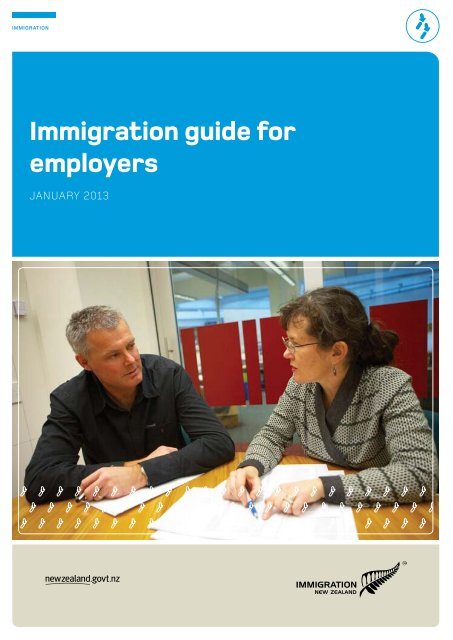
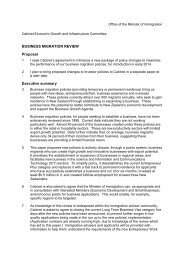
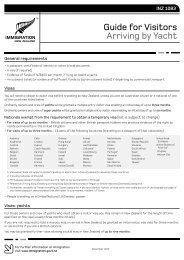
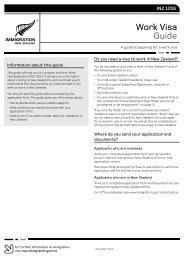
![Long Term Skill Shortage List PDF [200KB] - Immigration New Zealand](https://img.yumpu.com/15876707/1/184x260/long-term-skill-shortage-list-pdf-200kb-immigration-new-zealand.jpg?quality=85)
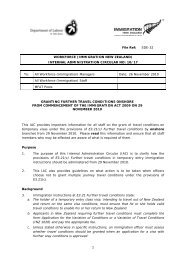
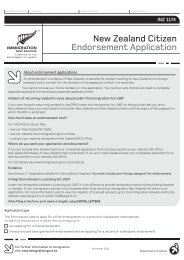
![New Zealand Residence Programme Fact Sheet PDF [161KB]](https://img.yumpu.com/14040475/1/184x260/new-zealand-residence-programme-fact-sheet-pdf-161kb.jpg?quality=85)
